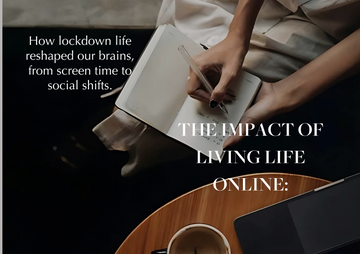Working from home, socializing via Zoom, and having minimal face-to-face contact were changes we all had to adapt to during the COVID-19 pandemic. Here, experts explain how lockdown affected our brains.
We might be fully grown adults, but our brains never stop changing or developing in response to our experiences. It stands to reason, then, that living through a pandemic—with all of its emotional, social, and practical implications—would have had an impact on our brains.
Dr. Peter Gallagher, senior lecturer in neuropsychology at Newcastle University, explains, “The brain is a very plastic, adaptable thing. It’s going through changes all the time—connections are constantly being made and pruned. That’s how our memories are formed, by making and breaking connections. It’s a very dynamic organ.”
So, although we did far less back in 2020 than our normal lives would usually have dictated, our brains continued to react and reshape according to what we were doing. Even communicating primarily through apps like Zoom changed our brains.
“Every experience we go through causes some degree of change within the brain,” adds Dr. Gallagher. “There are millions and millions of connections, and they alter in response to our experiences. What we went through during the pandemic was, depending on the individual, a period of low or high stress. Stress elevates certain chemicals in the body, and those chemicals can change things in the brain. Cortisol, sometimes called the stress hormone, reacts to stress. If we are chronically worried, our cortisol levels are likely higher than they would be otherwise. We need cortisol to make memories, but if levels are too low or too high, that can cause problems for memory and also affect our mood.”
Making Memories
If you found it difficult to stay motivated or focused during the pandemic, or noticed your days blurring into one, it’s because we were losing that richness of experience—making the days feel indistinguishable from one another.
No Small Talk, Big Impact
With most of us working from home and socializing through screens, the way we communicated changed. We had to work harder to connect and read others’ reactions. Without face-to-face interaction, such as chatting at the school gates or the office water cooler, there was a noticeable absence of casual conversation in our lives. Though it may sound trivial, this everyday chatter is a fundamental part of social bonding. The lack of such interactions could have impacted our confidence and concentration.
Dr. Angharad Rudkin, a clinical psychologist, explains that online communication became very functional, with emails becoming more direct and conversations more goal-oriented. As a result, many of us missed out on the social niceties and bonding experiences that come with small talk.
“A lot of the psychological strokes we get from everyday work experiences—such as a chat around the kettle or sharing a funny story over lunch—were missing,” she says. “This can leave people feeling less confident and more anxious than before. It can also have a knock-on effect on our concentration, empathy, and self-esteem.”
As online interaction became the norm, many of us felt "brain strain" after hours of screen time with little interpersonal connection. “Our brains are highly complex systems, designed to take in thousands of stimuli every minute,” says Dr. Rudkin. “Socializing and working online removes many of the cues we would ordinarily pick up on, meaning we have to work harder to function. Anecdotal evidence suggests that people feel more tired after being on screens, and social interactions are less satisfying. That’s why we often feel drained and unfulfilled after another virtual meeting or at the thought of a Zoom quiz.”
Screens vs. Sleep
Many people struggle with sleep, whether occasionally or on an ongoing basis. Dr. Clara Russell reminds us how vital sleep is to our brain health. “When we sleep, our brains perform unique tasks that can only happen during sleep. Broken sleep impacts how we deal with stress, our appetite, and our memory. It may also increase the risk of Alzheimer’s disease.”
Sleep also has a direct relationship with the presence of feel-good chemicals like dopamine in the brain. Without enough quality rest, dopamine levels drop, affecting our anxiety and overall mood.
Since the pandemic, with much of life now online, many people spend hours in front of screens—working, socializing, and relaxing with TV or streaming services—which can disrupt sleep. Dr. Russell explains, “Ongoing exposure to blue light from screens can affect our natural melatonin production, the hormone that plays an important role in our ability to fall asleep. Excessive screen time can suppress melatonin, making it harder to sleep.”
Dr. Russell recommends avoiding screens in the evening and getting exposure to natural daylight during the day to support your body’s circadian rhythm.
Be Kind
It might sound like a platitude, but according to Dr. Russell, acts of kindness can have a direct impact on the health of our brains.
“Our brains have mirror neurons that reflect the behavior and emotions we see. Noticing acts of kindness—and being kind ourselves—can support both our brain and emotional health.”
If you’ve found yourself feeling particularly gleeful at the arrival of a takeaway or waving at a friend from a distance, it’s because our definition of joy has changed. “The small things became the big things during this experience for many of us,” explains Dr. Russell. “We had to change our behaviors and how we found joy—whether it was the excitement of a delivery, sending a postcard, or seeing a neighbor’s friendly face.”
Lost for Words
Many people felt out of practice when it came to casual conversation during the pandemic, and many experienced being at a loss for words. Experts believe this was due to a decline in concentration skills. Although life felt quieter, our minds were full.
While our social circles shrank, the stress of living in a modern pandemic put strain on our brains—leading to that frustrating tip-of-the-tongue feeling. Dr. Russell, a GP and founder of the brain-health supplement brand Noggin, explains, “Constant distraction plays a key role in our inability to focus and recall day-to-day facts. Combine that with the repetitive nature of life in lockdown and the lack of routines, and it’s easy to see how one day could blend into the next—unless, of course, it was garbage day.”
So while our physical worlds became smaller, our mental loads increased. Whether you were balancing remote work, screen fatigue, financial worries, health concerns for older relatives, or relationship stress—all of it meant our brains were processing multiple challenges at once, often on a continuous loop.
This mental overload can be debilitating and distracting. Dr. Russell agrees. “All these factors can also contribute to chronic stress, which impacts short-term memory.”
While the broader context of the pandemic was outside of our control, there were still things we could do to improve focus. Dr. Russell recommends mindfulness exercises and meditation to retrain attention. She also suggests that families play memory games to boost verbal fluency, helping us regain access to those elusive words.
Preparing for Re-entry
If our brains weren’t forming memories at the usual rate and our focus was diminished during the pandemic, how did we respond when the world reopened?
For some, re-entering society felt overwhelming. For others, it was a relief. According to Dr. Gallagher, this varied from person to person. “How we adapt is a very individual thing,” he says. “Some people slipped back into old routines quickly, while others felt awkward. At first, there was anxiety around safety and the risk of infection. But eventually, we picked those social skills up again.”







